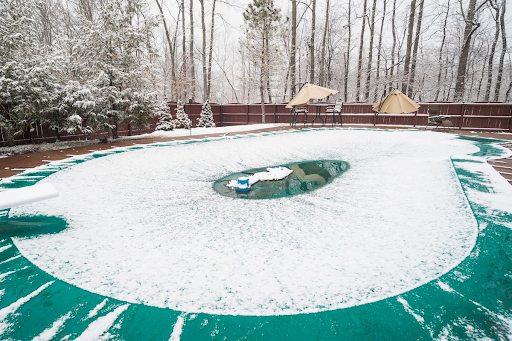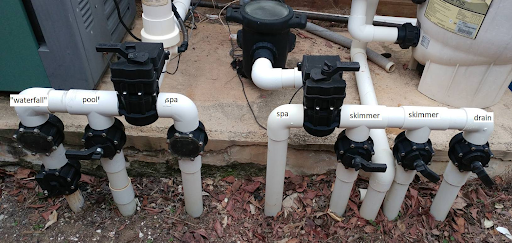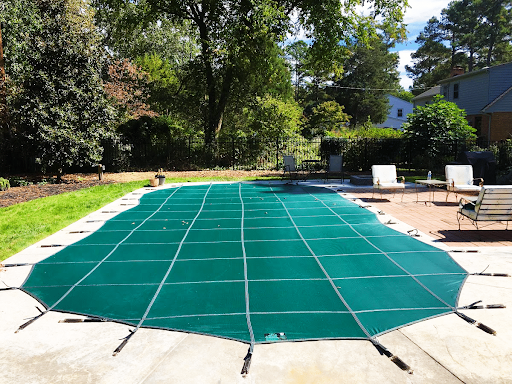
Owning a swimming pool is an excellent way to enjoy yourself with your family and friends, that too, inside your home premises. However, this pleasure comes with tons of winter and other off-season responsibilities. If your pool isn't properly maintained, harsh weather conditions can harm it.
Many pool owners have this common question in their minds if they could keep their swimming pools open all winter. We have made the answer pretty simple. Yes, you can. How much could it be used for swimming? We will get to that shortly.
Read below everything you need to know about keeping your swimming functional during winter, from pros, cons, and all other requirements
Reasons Behind Keeping Your Pools Open In Winter.
Below are a few reasons you should think about keeping your pool open in the winter season.
Extended swim season.
With temperature-controlled water comes a more extended swim season during the cold weather. That means a longer time to relax, a few more laps, and outdoor fun with family and friends with the stunning view of the water on winter nights.
No need for winter cover.
If you want your swimming pool to keep functioning in the winter, it is unnecessary to cover it with a winter cover. Covering your pools occasionally helps in the improvement of cleanliness and heat retention.
Re-opening of the pool is not required.
Since you want to keep your pool open in the cold season, you can easily save yourself from the lengthy process of reopening it in the Spring season.
A cleaner pool in spring.
Similarly, there is no need to clean up your pool in the spring because you did not close it in the winter season in the first place.
Essential Factors To Consider To Keep The Pool Open.
Temperature.
People living in the South or West can easily prolong their swim season, while those who live in the North and extremely cold weather conditions can keep their swimming pools open but can only swim for a limited period.
Budget for the pool pump.
The pool pumps need to operate constantly to keep the water moving at low temperatures. This prevents the water from freezing and means more energy use, thus increasing the budget cost.
Swimming habits.
If you are willing to keep your pool open just to reduce cleaning labor in spring, that is great. But if you are a regular swimmer, keeping your pool open and heated is an excellent way to enjoy the water and keep up with the workout.
Prepare To Use Your Swimming Pool During Winter.
Keep the pool pump running continuously.
If you want to prevent your pool water from freezing, then you should keep the pool pump running 24/7. Why? This would constantly keep the water moving, thus not letting the water freeze when the temperature gets too low.
Install an automated freeze protector.
It is practically impossible to stand by the pool with a thermometer to check the water temperature. So how do you do it? Installing an automatic timer is the answer. The automatic freeze protection timers operate by turning the pool pumps on and off whenever they reach the temperature pre-set. They can also manage the heat pool pump for your swimming pool the same way they do for the pool pumps. Installing an automatic timer freezer protector is a wise investment if only you want your swimming pool to remain functional in the winter season.
Keep your pool water warm.
This point targets people who wish to make their swimming pools swimmable in cold weather conditions. However, while the pool pumps are constantly running, swimming is not recommended in some parts of the world with temperatures below zero because the water is too cold to be swimmable.
In areas with milder winters, you can still keep your pool warm, extending your swim season. Even if the temperature gets to 60 degrees, the heat pump installed in your swimming pool will keep the water warm enough to be swimmable.
Keep all the valves open.

Pools with complicated plumbing features and many pipes and valves should remain partially open. This would help the pool water move through each part of the system. Usually, pools with spas have their drains closed during the summer, but they should remain slightly open in the winter to keep the water moving through them. Vacuum lines, waterfall lines, cleaner lines, drainers, skimmers, and returns, all pipes and valves should remain open.
Keep the pool clean.
Maintaining the swimming pool in cold weather is much more convenient than in the summer season, especially after the fall of the leaves when the outdoor space gets cleaned. Pools are located in areas with fewer or no trees; cleaning is much easier than pools with lots of trees and plants around. However, you should not neglect your uncovered pool. The pool water can quickly become stained from the top with lesser swims and shorter filter runs. Therefore, regular brushing and vacuuming the walls and floors of the pool to remove during winter is essential.
Switch from salt generator to regular chlorine.
Since salt generators do not operate appropriately at colder temperatures, you would have to switch to regular chlorine for your swimming pool during the winter. Though this is not a big deal, do not forget to keep your pool sanitized and clean. You can buy a gallon of liquid or powder chlorine for this reason.
Ensure the balance of the water.
Swimming pools do not require as much chlorine in the winters as in the summer season. And not at all, when the temperature reaches the 40s. However, you still need to keep the pool water balanced. Ensure that the water in your pool has reasonable pH ranges, alkaline, cyanuric acid, and calcium, along with a balanced level of chlorine and algaecide. An uncovered pool absorbs the atmosphere in the winters and messes up the water chemistry, which leads to surface stains and poor water quality.
Keep the pool covered.

If you do not wish to swim in the pool during winter, it is best to keep them covered. This prevents the heat from evaporating, thus saving you time and money (low energy cost).
If you still want to swim in your pool, you can go for solar pool covers. They are easy to set up, lightweight, and removed instantly.
Close the pool's water features.
If your pool consists of wall fountains, deck jets, waterfalls, or cascades, consider winterizing their pumps and pipes while keeping the pool's major plumbing features in operation. We recommend the closure because the water enters the pipes and pumps through cracks and freezes if left open. You can enjoy them back in the summer.
If there is no power
Here are a few tips to keep your pool safe in a power outage due to a winter storm.
- Drain plugs for the heater, pumps, and filters should be removed.
- The breaker should be turned off for the pump and the heater.
- The valve lines should be closed.
- The filter for the air pressure release should be left open.
Pros & Cons
Have a look at some pros and cons of leaving your pool open during the winter season.
Pros.
- Enjoy the stunning view of your pool all year long.
- Leaving the pool open saves you the money required for winterization, pool covers, and other winter supplies.
- The pool is swimmable and useful in all 4 seasons with a heat pump or gas heater.
Cons.
- Heavy on pockets since the pool pump runs 24/7.
- Salt generators do not usually work with cold water and air temperature.
- High risk of freezing damage due to loss of power, operating error, or equipment failure.
Quick dos and don'ts for the swimming pool in winter.
The Dos.
Do check your systems regularly: Check the pipes and other motorized parts of your pool when the temperature drops below freezing point. Drain the water from the pool pump, heaters, and pool filters.
Do take care of winter safety covers: Covering your pool is simply not enough. You need to ensure that the pool cover fits appropriately on your pool and prevents debris and dirt from getting inside. If the cover consists of an air pillow, ensure that it does not deflate or flatten.
Do educate yourself about the pool chemicals: You need to be aware of the chemicals the pool requires during winter.
Algaecide: This chemical keeps the green gunk away from sitting on the pool's floor and walls.
Chlorine: Add chlorine in the cold season for a quick pool sanitization and clean-up so that the water becomes swimmable as soon as the temperature rises a little. However, the quantity of chlorine to be added should continuously be monitored.
Other off-season enzymes: Adding enzyme cleaners to your pool will help break down non-living organic compounds like pollen and animal waste.
The Don'ts.
Don't keep the filters off for too long: Do not turn the pool filter off if you plan to use the pool in the winter season. Even if no one is swimming, the filter still needs to operate to keep the water clean and away from staining.
Do not wait for long to re-open the pool: When not in use, your swimming pool is just a standing water body since the pumps and the filters aren't really doing anything. Therefore, open up your pool weeks before summer to prevent algae from growing in the stagnant water and blooming rapidly.
Parting Ways
If you want to keep your swimming pool functional all year long, you must consider following all the points mentioned above. Even in extreme cold weather conditions, with the tips mentioned above, you would be able to close the pool late, like just 3 or 4 months before winter instead of 7 or 8 months, and open it early before summer arrives.
